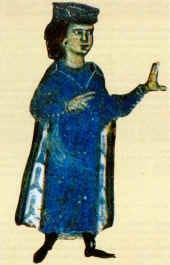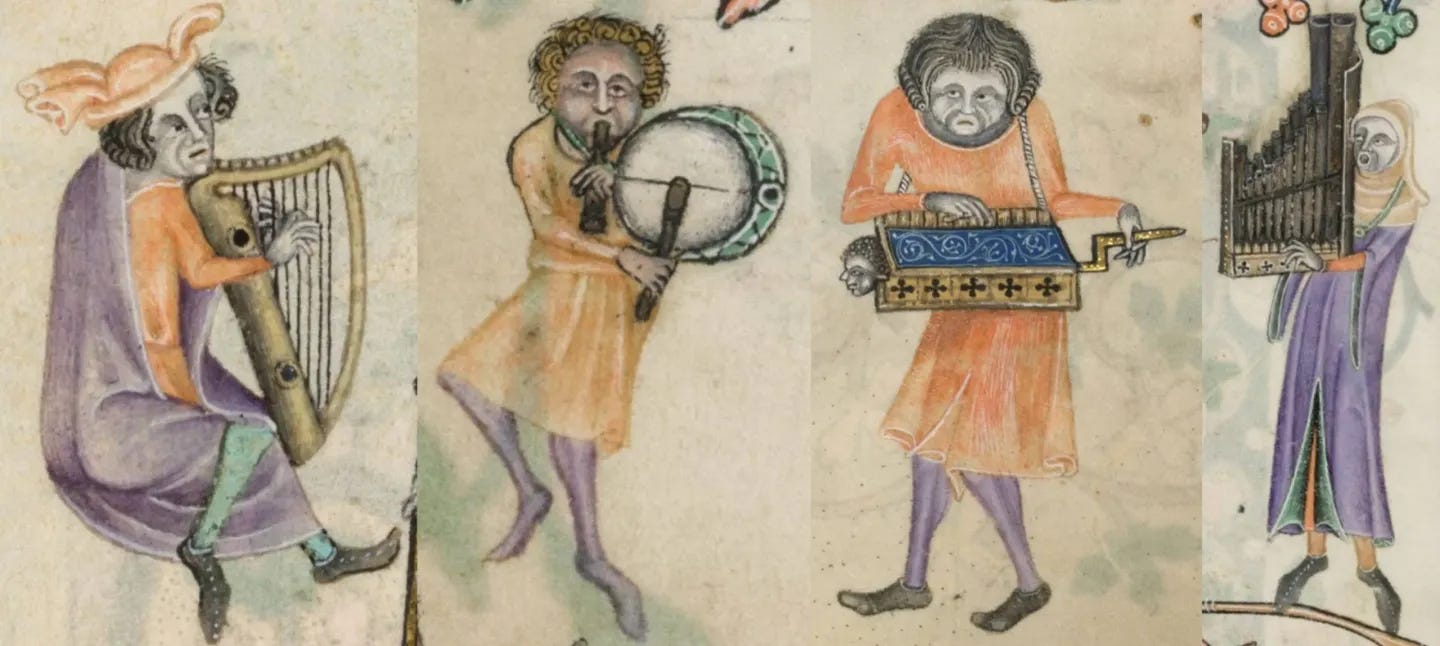The Troubadours: Part I
The rise of courtly love and chivalry
If you’ve been following this substack for long, you’ve seen the music we start each post with—generally the music of troubadours.
Over the next month or so, we’re going to dive into the music of Richard’s era, secular music in particular, which means the troubadours. Until the troubadours came along, medieval music was mostly religious. The troubadours brought love songs and chivalry to life in music performed at court in 12th century southern France. We’ll listen to some of their music and read some of their lyrics (some elegant, some romantic, some bawdy or verging into obscene). Over a few posts, we’ll trace how the troubadours, encouraged by Richard’s mother Eleanor of Aquitaine, gave rise to the ideas of courtly love, romance, and chivalry, and led more or less directly to the legends of King Arthur as you know them now—Excalibur, Lancelot and Guinevere, and all that. We’ll talk about Richard’s own songs, his relationship with the (mythical?) troubadour Blondel, and see also how female, Arabic and Muslim influences helped spark the rise of secular song and literature in medieval Europe.
12th Century Singers from the south of France
So, what exactly was a troubadour? The term evokes images of wandering minstrels, romantic poets strumming lutes, singing sweet nothings beneath moonlit skies. While that captures some of their essence, troubadours were often more than mere singers of love songs—they were often soldiers, knights and lords in their own right, sometimes quite powerful lords. Emerging in the 12th century in the south of France, they were composers of poetic songs, performed for and at the courts of lords. They became pivotal figures in the cultural landscape of medieval Europe, transforming the nature of poetic expression and setting the stage for the rise of romantic literature and chivalric ideals. If you’ve read a romance novel, listened to a love song, pined for a lover you cannot (or should not) have, or thought about the proper chivalric behavior in a certain situation, you’re living the heritage of the troubadours.
The troubadours originated in the (broadly interpreted) Languedoc region of France, which includes the southeastern area known as Provence—or perhaps familiar to you through the name Carcassonne—as well as the southwestern quadrant of Aquitaine, which encompasses cities like Bordeaux, Limoges, and Poitiers.
The word Languedoc is a contraction for langue d'oc, which translates to the ‘language of yes’. The language of the south of France at this time was called Old Occitan, and the Old Occitan word for yes is oc. By contrast, in the north of France, what was spoken was the langue d'oïl (oïl would eventually become oui in French, ‘yes’). Old Occitan is also sometimes referred to as Provençal.
A fun (30 minute) documentary about the troubadours - castles, music, landscapes…
Aquitaine borders northern Spain, and during this era, much of the Iberian Peninsula, known to the Arabs as Al-Andalus (to us, Andalusia), was under Muslim control. To the south of Aquitaine lay the Pyrenees mountain range, and then the Spanish kingdoms of Navarre, Aragon and Castile, all providing a buffer for Aquitaine. As a result, Aquitaine was a relatively peaceful place. The courts of lords became more concerned with courtly behavior, courtly love, and music, rather than war. Though conflict was at a lull, there was lively commerce and cultural exchange between Aquitaine, the Spanish Kingdoms, and the Berber Muslims, centered in Córdoba, one of the largest cities in Europe at the time.
The First Troubadour
It was in the courts of Aquitaine that the troubadours arose, where noble patrons celebrated the art of lyric poetry and song. Often, the noble patrons were themselves the poets.
The first attested (i.e. documented) troubadour is William IX of Aquitaine, sometimes written as Guilhem de Peiteu or Guillaume de Poitiers. He was the duke of Aquitaine, a great lord indeed, and kept court at Poitiers. William was a fascinating character—a lord, a soldier, a poet, and probably kind of a cad. He went on the Crusade of 1101, undoubtedly bringing back Arabic influences, and perhaps even Arabic entertainers. It is sometimes speculated that he even knew Arabic.1 We’re going to come back to him in detail in a later post, but for now, remember that he was the first troubadour, and Eleanor of Aquitaine’s grandfather, and thus Richard the Lionheart’s great grandfather.
By the way—most troubadours were men, but not all of them. There was a class of female troubadours, referred to as trobairitz. We’ll come back to them, as well as the Arabic female slave singers called Qiyan, in a later post.
OK, quick break for another song. Perhaps one of the most recorded, and hence most famous troubadour songs is Kalenda Maya (the calends of May), by Raimbaut de Vaqueiras.
Neither calends of May,
nor leaves of beech
nor songs of bird, nor gladiolus flowers
are of my liking,
o noble and merry lady,
until I have a fleet messenger
of your beautiful person to tell me
of new pleasures love and joy
are bringing;
and I repair
to you, true lady;
and let me crush
and strike
the jealous, before I depart from here.
Courtly love, romance, and eventually, chivalry
Unlike their poetic predecessors, troubadours focused on themes of courtly love rather than heroic battles. Their songs and poetry often explored the nuances of romantic relationships, celebrating love's joys and sorrows. Troubadour songs about love were a new thing—before them, one has to go back to the time of Julius Caesar and Ovid to find a tradition of poetry and songs about love. It’s hard to overstate what a departure from tradition this was. In doing this, troubadours became the torchbearers of a new literary movement, emphasizing personal emotion over collective heroism.
In this era, marriage was rarely for love as we know it today, at least for nobles. For them, marriages were usually arranged, and intended to create political bonds and heirs rather than to satisfy an emotional need. So the troubadour songs tended to celebrate, well, adulterous love. In the troubadour songs, the man is typically portrayed as the servant to his paramour’s desires, in contrast to a marriage, where the lady was utterly subservient to her husband, at least at law and in the eyes of the church.
Eventually, the troubadour love songs of the south moved north, with Eleanor of Aquitaine when she married King Louis VII of France, and collided with the more heroic military culture of the north. Out of that would come the works of Chretien de Troyes, often called the father of the modern novel.2 His works combined the adventures of epic heroic poetry with the issues of courtly love the troubadours sang about, embodied in his works like Lancelot, the Knight of the Cart, and Yvain, the Knight of the Lion, and others. His poems would have a powerful influence on the Arthurian tradition that led to Malory’s Le Morte d’Arthur and continues to this day.
Some familiar words
The word troubadour is probably familiar to you, even if you were unaware of their history. The term troubadour itself derives from the Occitan verb trobar, meaning “to find” or “to compose”. This reflects their role as creators of original works.
There are many words likely familiar to you that arise in this context: minstrel, juggler, jester, minister, courtesy, courtly.
The court of a lord in France this era would have many officials in his entourage. These officials might be major officials, or minor. The former were called magisters, the latter ministers. From magister we get cognates like magistrate, majesty, mayor, and master. Minor officials at court were known as ministers (the religious sense of the word minister would come later). Ministers that performed entertainment came to be known as minstrels. Eventually this word would imply singing specifically, although it did not to begin with. Another Occitan word for entertainers was jongleur. If you have followed previous mentions of Ambroise, the author of The History of the Holy War, a first person account of the Third Crusade, he is usually referred to as a jongleur, a “performer”. From jongleur, we will eventually get the word juggler, with joke and joker as cognates, though at the time jongleur meant something more like a teller of tales.3
You would think the word jester would also be derived from the jongleur family, wouldn’t you? Turns out, no. You may recall we wrote about Durendal and La Chanson de Roland, The Song of Roland, which is an example of a French chanson de geste. A chanson de geste is an epic poem, a “song of heroic deeds”; the word geste means “deeds”. Therefore a jester is not a joker, he or she is a teller of tales of heroic deeds.
Courts were also places where legal matters might be discussed, leading to our judicial sense of the word court. It is also a place where romances began to flourish; our modern romantic sense of “court”—to attempt a relationship—can be traced here, as well as courtesy, a word for courtly (proper) behavior.
Until next time…
The troubadours gave rise to a tradition of courtly, romantic poetry and song that spread across Europe, to include the trouvères of Northern France, and the minnesänger of Germany, both poet/singers in the tradition of troubadours. The troubadours influenced the (English!) Arthurian tradition by inspiring and influencing the works of Chretien de Troy, Wolfram von Eschenbach (Parzival, for example) and others in Europe, and these stories would returned home to England via Sir Thomas Malory’s Le Morte d’Arthur.
The connection between troubadours and the rise of romance literature cannot be overstated. Their emphasis on courtly love and the ideals of chivalry were instrumental in shaping the literary canon of the Middle Ages. The troubadours not only wrote about love; they also created a cultural framework that glorified the act of loving itself. This interplay between love and chivalry became a cornerstone of medieval literature, influencing later writers and poets who sought to capture the intricacies of human relationships.
Next week, we’ll explore some specific troubadours, including William IX, and their music.
https://www.jstor.org/stable/45039158#:~:text=known%20troubadour,%20William%20IX%20of%20Aquitaine
https://en.wikipedia.org/wiki/Chr%C3%A9tien_de_Troyes
If you enjoy the history of words, you may enjoy this podcast, which explores more deeply the etymology of the words discussed here.




